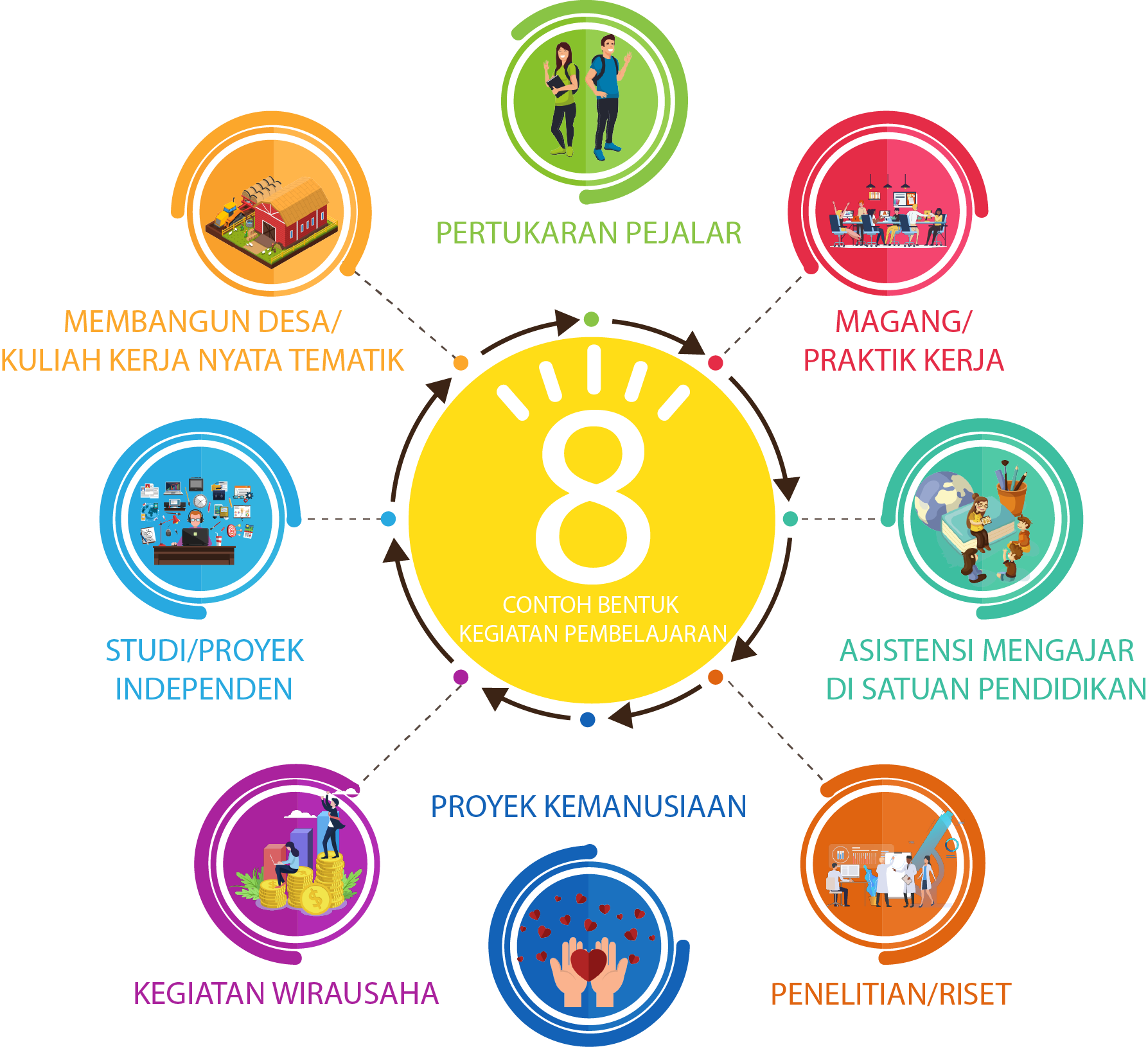The documentations of Merdeka Belajar, Kampus Merdeka:
Through the Ministry of Education and Culture, the government started an educational revolution in 2019 at the elementary, middle, and high levels. The concept that was promoted in this revolution was freedom to learn in all aspects of formal education. Economic, social, and cultural changes also occur at a high rate. Learning transformation is needed to equip and prepare higher education graduates to become an excellent generation.
Through Merdeka Belajar–Kampus Merdeka, students have the opportunity for 1 (one) semester or the equivalent of 20 (twenty) credits to study outside the study program at the same university; and a maximum of 2 (two) semesters or equivalent to 40 (forty) credits of studying in the same study program at different universities, learning in different study programs at different universities; and/or learning outside of Higher Education. Learning in the Kampus Merdeka provides challenges and opportunities for the developing creativity, capacity, personality, and student necessity, as well as developing independence in seeking and finding knowledge through realities and field dynamics such as ability requirements, real problems, social interaction, collaboration, self-management, performance demands, targets, and achievements.
The form of learning activities under Permendikbud No. 3 of 2020 Article 15 paragraph 1 can be carried out inside the Study Program and outside the Study Program, including:

- Student Exchange: shaping several student attitudes as stipulated in the Regulation of the Minister of Education and Culture (Permendikbud) Number 3 of 2020, namely respecting the diversity of cultures, views, religions, and beliefs, as well as the opinions or original findings of others; and work together and have social sensitivity and concern for society and the environment.
- Nowadays, students lack work experience in the real industry/professional world, so they are not ready to work. Meanwhile, short-term internships (less than six months) are insufficient to provide students with industry experience and competence. Companies that accept internships also state that short-term internships are not helpful and even interfere with activities in the industry. The objectives of the internship program include Internship program 1-2 semesters, providing sufficient experience to students, and direct learning in the workplace (experiential learning). During the internship, students will gain hard skills (skills, complex problem solving, analytical skills, etc.) and soft skills (professional/work ethics, communication, collaboration, etc.).
- Meanwhile, the industry gets talent that, if suitable, can be immediately recruited, thereby reducing the cost of recruitment and initial/induction training. Students familiar with the workplace will be more stable in entering the world of work and careers. Through this activity, industrial problems will flow to universities, then updating lecturers’ teaching and learning materials and research topics at universities will be more relevant. Learning activities in collaboration with partners include companies, non-profit foundations, multilateral organizations, government institutions, and start-up companies.
- Primary and secondary education quality in Indonesia is still deficient (PISA 2018 ranks Indonesia 7th from the bottom). The number of academic units in Indonesia is vast, and there are various problems in formal, non-formal, and informal education units. Learning activities in teaching assistance are carried out by students in academic units such as elementary, middle, and high schools in urban and rural areas.
- For the students interested in research, the Merdeka Belajar program can be implemented through research through the research institution and study center. Through research, students can develop critical thinking, which is needed for various scientific groups at the higher education level. With the ability to think critically, students will deepen, understand, and be able to do research methods better. An internship opportunity in a research center is the dream for students interested in being research professionals. Besides that, the laboratory/research institutions sometimes lack junior researchers.
- Indonesia has experienced many disasters. So far, the involvement of students in humanitarian projects is only voluntary and short-term. The humanitarian program project aims to prepare excellent students who uphold human values so they can carry out their duties based on morals, religion, and ethics. Train students to have social sensitivity according to their interests and abilities.
- The entrepreneurial potential for the millennial generation has not been appropriately managed so far. The Independent Campus policy encourages the development of student entrepreneurial interests with appropriate learning activities programs. The objectives of the entrepreneurial activity program include: providing students interested in entrepreneurship to develop their business early and be guided, in addition to dealing with unemployment problems that produce intellectual unemployment among scholars.
- Many students have a passion for realizing great works that are contested at the international level or works of innovative ideas. Ideally, independent studies/projects are carried out to complement the curriculum already taken by students. Colleges or faculties can also conduct independent studies to complete topics that are not included in the class schedule but are still available in the syllabus of the study program or faculty. Independent project activities can be carried out through cross-disciplinary group work.
- KKNT activities are expected to hone soft partnership skills, cross-disciplinary/scientific team collaboration (cross-competence), and student leadership in managing development programs in rural areas. So far, universities have implemented the KKNT program. Unfortunately, the Semester Credit Units (SKS) cannot or can be recognized following the independent campus program, whose credit recognition is equivalent to 6-12 months or 20-40 credits. It is also hoped that after the KKNT implementation, students can write down the things they have done and the results as a final project.


